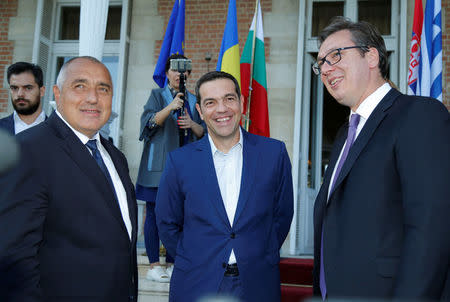Leave the past behind, Bulgarian PM tells Balkan leaders

SARAJEVO (Reuters) - Western Balkan countries aspiring to join the European Union should leave the past behind and solve their mutual problems first, Bulgarian Prime Minister Boyko Borissov said on Friday.
The EU won't do it for them, he said.
Albania, Macedonia, Montenegro and Serbia are official candidates for EU membership while Bosnia and Kosovo are seeking the same status. But past rivalries are still hurting relations between some of the countries which were embroiled in the Balkan wars of the 1990s.
Borissov said that Bulgaria, Austria and Romania, the three countries which will chair the EU presidency over the next two years, were ready to support the accession of these countries into the wealthy bloc but a key for the progress was compromise by their political elites.
"Nobody can help unless we realise that the past needs to remain in the past and that we need to move forward," Borissov said at a news conference during an official visit to Sarajevo. "Unresolved matters must be resolved today along with all political sacrifices that need to be made."
"This cannot be solved by Europe, which has its problems and fears," Borissov said.
The pace of Serbia's integration into the 27-member bloc was made conditional on the progress of a dialogue with its former province of Kosovo, which declared independence in 2008.
In Bosnia, inter-ethnic tensions have risen after Bosnian Serbs and Bosnian Croats had revived aspirations for greater territorial autonomies within the country they share with Muslim Bosniaks, relying on their wartime allies Serbia and Croatia.
Borissov said that "radical Islam is a problem" but that his Bosnian counterpart Denis Zvizic has assured him that Bosnia was not under the threat of radicalised Muslims.
"Islam in Bosnia is certainly one of most tolerant forms of Islam practised in the world and any kind of radicalisation has not and will not be allowed," Zvizdic said at the same news conference.
In September, the EU confirmed its pledge for a credible enlargement perspective for the region, which it sees as important for issues from controlling immigration to countering security threats ranging from alleged interference of Russia to radical Islam. [ID: L5N1LU2GX]
(Reporting by Daria Sito-Sucic and Reuters TV; Editing by Jeremy Gaunt)

